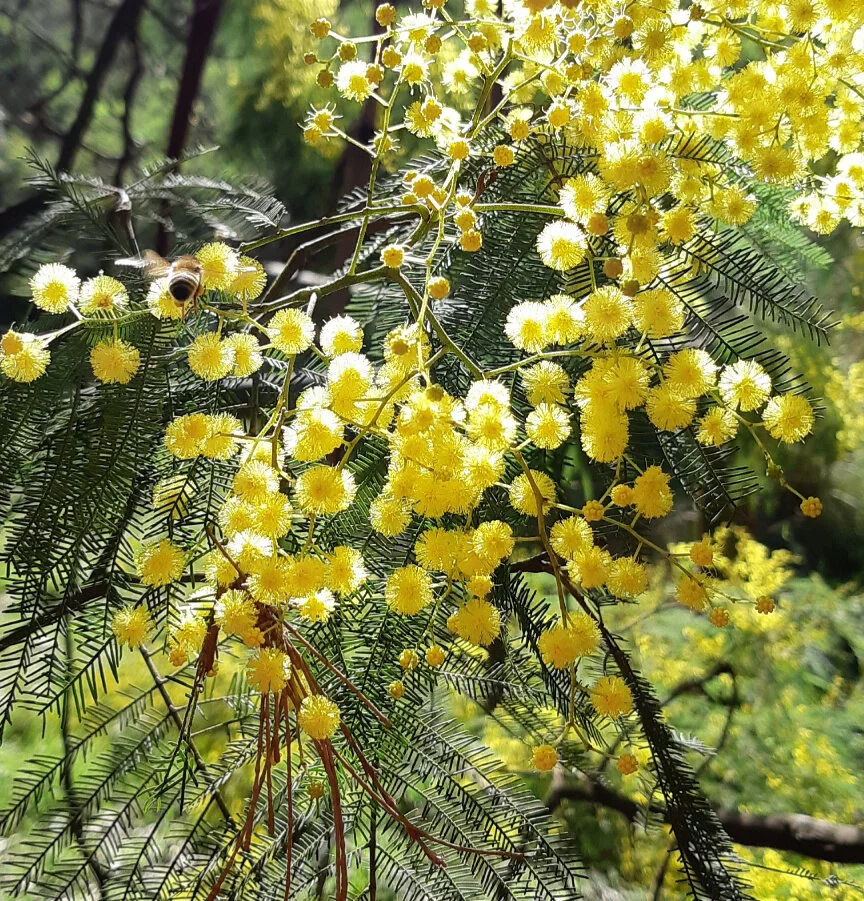Behold the wattle!
By Roland Ashby
Behold, I bring you good tidings! (Luke 2:10)
“The glory of God is a human being fully alive; and to be alive consists in beholding God.” So said St Irenaeus in the second century.
While the first part of the quotation, “The glory of God is a human being fully alive” is often quoted, the second part, which makes clear that being alive is conditional upon beholding God, is often ignored. Perhaps because it is not understood.
“The word Behold is arguably the most important word in the Bible”, argues theologian Maggie Ross, who laments that while it occurs over 1,300 times in the King James Bible, it has disappeared in most modern translations. “And with it have vanished the contemplative threads that are woven into the original languages.”[1]
It’s important, she believes, because it “recognises that something outside ordinary experience is happening.” It describes, she says, an experience or encounter that is outside the mind’s “conceptual and linguistic framework and therefore its ability to describe”.[2]
Moreover, “Behold is a word that alerts us to pause, however briefly, to be vigilant, because something new, something startling, is about to be revealed.”[3]
It describes a process, she believes, in which the mind is “temporarily brought to silence”, a death which leads to “the arrival of a new perspective”, a resurrection. “If we live in beholding we continually live in a new creation.”[4]
Franciscan priest Richard Rohr says that someone who is truly beholding “is silenced with the utter gratuity of a thing. We let it give us a leap of joy in the heart and in the eye.”
“Once we decide to behold,” he adds, “we are available for awe and wonder, to be present to what is, without the filter of our preferences or the false ledger of judging things as important or not important. A much broader, much deeper, and much wider field of perception opens up, becoming an alternative way of knowing and enjoying. The soul sees soul everywhere else too: ‘deep calls unto deep,’ as the psalmist says (42:7). Centre knows centre, and this is called ‘love.’
“Beholding happens when we stop trying to ‘hold’ and allow ourselves to ‘be held’ by the other. We are completely enchanted by something outside and beyond ourselves. Maybe we should speak of ‘behelding’ because, in that moment, we are being held more than really holding, explaining, or understanding anything by ourselves. We feel ourselves being addressed more than addressing something else... it becomes an epiphany and the walls of your world begin to expand.”[5]
St Irenaeus believed that contemplation of nature is “the initial step for all of us to come to knowledge of God”. So I invite you, when you next take a walk or work in the garden, to pause and behold something which takes your eye. It may be a flower, a tree, the sky, a bird. Continue looking at it until, as it were, you are seeing it for the first time. What do you notice that you haven’t noticed before? Be totally present to it, beyond any label or concept, and let all thoughts of past and future fall away.
Allow time for wonder and enchantment to rise, for “joy to leap in heart and eye”, and be filled with gratitude for its “utter gratuity”.
[1] Maggie Ross, Silence: A User’s Guide, Volume 2: Application (Darton Longman Todd: 2018) 132-133.
[2] ‘Freefalling in the love of God’: an interview with Maggie Ross, published on Living Water on 22 October 2020. See: https://www.thelivingwater.com.au/blog/freefalling-in-the-love-of-god
[3] Maggie Ross, Silence: A User’s Guide, Volume 2: Application (Darton Longman Todd: 2018) 129.
[4] Ibid. 129.
[5] Adapted from Richard Rohr, Just This (CAC Publishing: 2017), 99–101.
